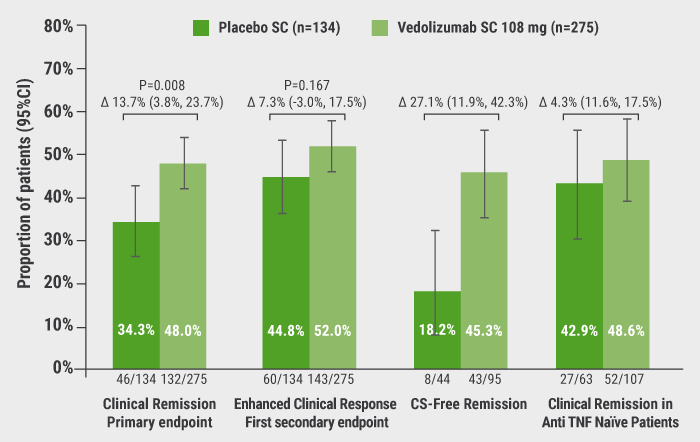A French head-to-head study included 239 patients, of whom 107 received ustekinumab and 132 vedolizumab [1]. After propensity scoring, there was no difference between the groups. After 48 weeks, the clinical remission rate was higher in the ustekinumab versus the vedolizumab group (54.4% vs 38.3%; OR 1.92; 95% CI 1.09–3.39). Other results after 48 weeks:
- Corticosteroid-free remission was numerically higher in the ustekinumab group (44.7% vs 34.0%; OR 1.57; 95% CI 0.88–2.79).
- Treatment persistence was significantly more frequent in the ustekinumab group (71.5% vs 49.7%; OR 2.54; 95% CI 1.40–4.62).
- The dose optimisation rate at week 48 was higher with vedolizumab (53.5% vs 30.1%; OR 0.37; 95% CI 0.21–0.67).
- Ustekinumab was associated with higher clinical remission rates in patients with ileal CD (OR 3.49; 95% CI 1.33–9.17), penetrating disease (OR 6.58; 95% CI 1.91–22.68) and a history of perianal disease (OR 2.48; 95% CI 1.04–5.93).
- Regardless of treatment group, combination therapy was associated with a higher clinical remission rate (OR 1.93; 95% CI 1.09–3.43).
In a comparable Dutch study, ustekinumab was also associated with higher efficacy than vedolizumab [2]. In a prospective registry specifically developed for comparative studies, a total of 128 vedolizumab- and 85 ustekinumab-treated patients fulfilled inclusion criteria, of which 69 patients in each group were then matched. The ustekinumab group was more likely to achieve corticosteroid-free clinical remission (OR 2.56; 95% CI 1.35–4.87; P=0.004), biochemical remission (OR 2.22; 95% CI 1.04–4.74; P=0.040), and combined corticosteroid-free clinical and biochemical remission (OR 2.58; 95% CI 1.15–5.78; P=0.022).
- Alric H, et al. ECCO-IBD 2020, DOP80.
- Biemans V, et al. ECCO-IBD 2020, DOP77.
Posted on
Previous Article
« On the cutting edge of pathology and surgery Next Article
Vedolizumab, adalimumab, and golimumab compared »
« On the cutting edge of pathology and surgery Next Article
Vedolizumab, adalimumab, and golimumab compared »
Table of Contents: ECCO 2020
Featured articles
Gut Microbiome as Treatment Target
Response to faecal microbiota transplantation in UC
Bioactives produced by gut bacteria to modulate immune response
Big Data Analysis
Multi-omics help describe CD phenotypes
The positive impact of genetic data on drug development
Experimental Therapies: Study Results
AMT-101: an oral human IL-10 fusion protein
Phase 2 results of first-in-class TL1A inhibitor
Open-label extension study of risankizumab: final results
Clinical remission after dose escalation of upadacitinib
Short- and Long-Term Treatment Results
Infliximab discontinuation increases relapse risk
Tofacitinib ‘real-world’ effectiveness in active UC
Subcutaneous ustekinumab as maintenance therapy in UC
Subcutaneous vedolizumab maintenance therapy in CD
Vedolizumab treatment persistence and safety
Specific Therapeutic Strategies
Impact of strategies on intestinal resection rate
Early ileocaecal resection in CD patients failing conventional treatment
Biologics before surgery in IBD do not elevate infection risk
Top-down infliximab superior to step-up in children with CD
High versus standard adalimumab in active UC
Head-to-Head Comparison of Treatments
Vedolizumab and anti-TNF therapies: a real-world comparison
Cancer Risk
Increased risk of small bowel cancer in IBD
Increased incidence of colorectal cancer and death in CD
Risk of rectal, anal cancer increased in perianal CD
Glyco-fingerprint as risk factor of UC-associated cancer
Miscellaneous Topics
Resolution of mucosal inflammation has dramatic effect
PICaSSO validated in real-life study
Re-inducing inflammation in organoids from UC patients
Role of immune cells in intestinal fibrosis
Association between meat consumption and IBD risk
CD exclusion diet corrects dysbiosis
Related Articles

April 14, 2020
Impact of strategies on intestinal resection rate

April 14, 2020
Subcutaneous vedolizumab maintenance therapy in CD
April 14, 2020
Infliximab discontinuation increases relapse risk
© 2024 Medicom Medical Publishers. All rights reserved. Terms and Conditions | Privacy Policy
HEAD OFFICE
Laarderhoogtweg 25
1101 EB Amsterdam
The Netherlands
T: +31 85 4012 560
E: publishers@medicom-publishers.com

